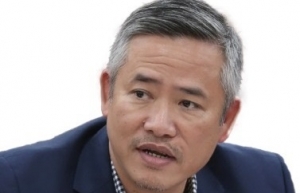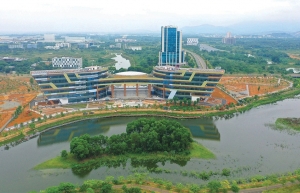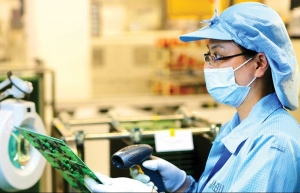Concerted effort to capitalise on investment trends
 |
| Nguyen Van Long, Independent legal counsel ALTAS Law |
In recent years, heightened geopolitical tensions and economic uncertainties globally have necessitated a reevaluation of supply chain dynamics. A compromise solution termed friend-shoring has emerged, denoting the relocation of supply chain activities to amicable jurisdictions, aiming to harness the benefits of globalisation while mitigating production disruptions arising from unfavourable geopolitical climates.
The US CHIPS and Science Act was established in 2022, providing $52.7 billion for semiconductor research, manufacturing, and workforce development. $500 billion has been earmarked for improving semiconductor training, cybersecurity, and business climates globally.
This is anticipated to catalyse substantial private investment in the sector, amounting to hundreds of billions of US dollars across the United States. Currently, priority industries have shifted towards allied nations of the US, encompassing sectors in which Vietnam stands to participate or leverage advantages, notably in semiconductors, electronics, AI, healthcare, energy, power source development, green mobility, infrastructure development, and logistics.
The US is prepared to invest funds into Vietnam’s chip sector to shore up supply chains and wants Vietnam to take advantage of its bid to reduce reliance on China.
The establishment of a comprehensive strategic partnership between Vietnam and the US was realised, underscoring Vietnam’s status as a primary beneficiary of the US CHIPS and Science Act. On March 18-21, 50 enterprises from the US visited Vietnam to conduct market research and expand investment opportunities. This marks the second consecutive year that Vietnam has welcomed a large delegation of US enterprises to explore investment opportunities and expand their market presence.
To capitalise on the provisions of the new legislation, Vietnam has resolved to promulgate Decree No.10/2024/ND-CP, delineating regulations pertaining to high-tech zones. This decree complements existing legislation on high-tech, with a principal focus on fostering investment opportunities within Vietnam.
These regulations are devised to invigorate Vietnam’s economy in the forthcoming years, featuring notable policies and incentives.
Projects within high-tech zones shall benefit from preferential credit loan schemes, prioritising access to state investment credit, legal forms of capital mobilisation, and utilisation of supportive financial resources such as official development assistance and preferential credit capital.
Tax incentives, land-related regulations, and expeditious administrative processes facilitated by an autonomous one-stop agency at the high-tech park management board aim to draw in investment capital domestically and abroad.
Key policies include incentives for infrastructure investment, land clearance and reimbursement in compliance with land rent regulations, and allocation of resources to support high-tech research and development projects, high-tech business incubation, and training of high-tech human resources.
The decree stipulates that the state encourages organisations and individuals with sufficient experience and capacity to participate in the investment, construction, and operation of high-technology infrastructure, including investing in and operating the entire technical infrastructure system of high-technology zones or a part thereof, as regulated in Article 23 of Decree 10.
These encompass investment support, import-export tax exemptions, and streamlined customs procedures. Additionally, eligible enterprises shall enjoy tax and customs incentives akin to export processing enterprises in industrial zones (IZs) and economic zones, as stipulated by pertinent legislation.
Indeed, Vietnam offers myriad promising investment prospects for investors in the semiconductor industry. Notably, Nvidia seeks to establish a substantial presence in the country with a $250 million investment.
In 2023, ALTAS effectively represented and advised a prominent foreign manufacturer of printed circuit boards in a significant investment project valued at $260 million for phase 1 in Chau Duc IZ in the southern province of Ba Ria-Vung Tau.
Additionally, the investor acquired a factory concession in Dong Nai province from Fujitsu Group with a transaction value of up to $300 million. The law firm has also participated in and represented negotiations for projects in the northern provinces of Bac Ninh and Bac Giang for semiconductor products, with a total capital of tens of millions of US dollars. This brings their total investment capital in Vietnam to $560 million, marking a significant milestone for their presence in Vietnam, with potential for further growth.
The issuance of Decree 10 signifies a concerted effort to capitalise on evolving investment trends. This initiative endeavours to cultivate an enabling environment conducive to the shifting dynamics of the international investment landscape, fostering economic innovation within the country.
| Colin Blackwell, head, Human Resources Working Group, VBF For Vietnam to become a first world country as planned, the Vietnamese must become a first world workforce. This has to involve international skills transfer and effective education. International skills transfer has to involve an element of foreign specialists coming to Vietnam to transfer their high tech and other skills. We absolutely agree and respect that Vietnam must be very careful in managing this process to ensure that only the most appropriate foreigners are allowed to obtain work permits. Vietnam’s continued advances in sustainability and innovation will require bringing international expertise into the country. Effective work permit procedures are an important element of assisting this. The business community would recommend some suggested steps that would help with work permits, which include easing the application time burden of administrative procedures, clarifying some of the wording of relevant decrees, and accelerating progress on digital applications. Processes should be clearer when applying for work permits directly from the ministry and we proposed mechanism applicable for permit sponsors when changing foreign labour management authority from provincial departments of labour, invalids and social affairs to the Ministry of Labour, Invalids, and Social Affairs. For instance, consider a scenario where a company abroad sells a high-tech product to a company in Vietnam and needs to send personnel for its installation, a process that may extend beyond 30 days. Under current regulations, the host entity in Vietnam is required to publish a job posting, wait for two weeks before submitting a foreign labour request for the role, and then wait another two weeks for approval before submitting a permit application. This process may not align with the needs of certain activities. Thus, we recommend the creation and implementation of a short-term work permit tailored for work missions lasting less than six months, exempt from the job posting and foreign labour demand requirements. The current process for preparing the necessary documents for a work permit, which must be duly notarised and legalised, is already sufficiently complex and time-consuming. Introducing a streamlined approach for short-term work permits would greatly enhance efficiency and flexibility for both businesses and foreign workers. Dr. Quan Le, senior lecturer Fulbright University Vietnam The semiconductor workforce in Vietnam has recently seen the introduction of chip-focused training programmes. However, human resources in electronics, embedded systems, and robotics are all suited to work in the semiconductor industry after additional short courses to supplement related knowledge. The major weakness of the current workforce lies in the lack of comprehensive experience in the entire chip design process, from design to sending for production. To address this weakness, there is a need for investment in professional simulation tools, funding for manufacturing test chips, and also modern laboratory systems for chip testing. For the foreseeable future, Fulbright University Vietnam plans to collaborate with both domestic and international universities and postgraduate institutions. Together, we aim to launch training programmes to enhance the capabilities of graduates who have completed relevant bachelor’s degrees, making them qualified to work in the semiconductor industry in Vietnam as well as participate in the global labour market. |
| Semiconductor development surge keenly anticipated Vietnam will look to build on its semiconductor diplomacy with the formulation of a strategy on developing the much-needed products. |
 | Consistency required for developing chip industry The Vietnamese government is now paying more attention to promoting research and development (R&D) and developing the semiconductor chip industry. However, to achieve this, depends on many factors, of which R&D, human resources, and others are critical. |
| Bac Giang makes its play for investment in semiconductors Vietnam is hoping to emerge as a top market for semiconductor production. Luong Van Nghiep, deputy director of Bac Giang Department of Planning and Investment, told VIR’s Minh Oanh about the northern province’s potential and its strategies to draw in foreign investors in the sector. |
 | High-tech capital influx expected More incentives for investors as part of a freshly enacted decree are expected to help draw more projects into high-tech parks, including in semiconductors. |
 | Major US groups taking long-term investment view As Vietnam and the US enter a new phase of economic relations, American companies are preparing to offer an expansion in investments. |
What the stars mean:
★ Poor ★ ★ Promising ★★★ Good ★★★★ Very good ★★★★★ Exceptional
Related Contents
Latest News
More News
- IP alterations shape asset strategies for local investors (January 22, 2026 | 10:00)
- 14th National Party Congress: Vietnam - positive factor for peace, sustainable development (January 22, 2026 | 09:46)
- Japanese legislator confident in CPV's role in advancing Vietnam’s growth (January 22, 2026 | 09:30)
- 14th National Party Congress: France-based scholar singles out institutional reform as key breakthrough (January 21, 2026 | 09:59)
- 14th National Party Congress: Promoting OV's role in driving sustainable development (January 20, 2026 | 09:31)
- 14th National Party Congress affirms Party’s leadership role, Vietnam’s right to self-determined development (January 20, 2026 | 09:27)
- Direction ahead for low-carbon development finance in Vietnam (January 14, 2026 | 09:58)
- Vietnam opens arms wide to talent with high-tech nous (December 23, 2025 | 09:00)
- Why global standards matter in digital world (December 18, 2025 | 15:42)
- Opportunities reshaped by disciplined capital aspects (December 08, 2025 | 10:05)

 Tag:
Tag:



















 Mobile Version
Mobile Version